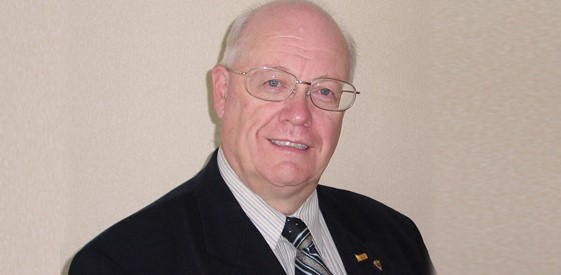Interview with Charles Mossop: The Golden Years
Charles Mossop grew up in Britain and Canada and completed his undergraduate and master’s studies as an international student at the University of British Columbia in Cultural Anthropology with a specialization in Asian studies. In 1970 he was employed at Cariboo College (now Thompson Rivers University) where he worked for the next 30 years as a pioneer of the International Education sector in BC. Retired now for 14 years, Charles works extensively with the Canadian National Institute for the Blind and the World Blind Union, continues to travel and is far from finished with his career.
He kindly agreed to share some memories of his ‘golden years’ in International Education with us via a phone interview…
What was it that first pulled you towards International Education? Was it your international upbringing or was it more your interest in Asian studies?
A bit of both I think. Thanks to the timing of when I lived in Britain, when I came to UBC I was actually an international student. In those days, very generally speaking an international student was not so much a student that was there on a student authorization, but anyone who had finished high school outside of Canada. Although my family and I were Canadian citizens, I had completed high school in Britain and was both a Canadian and an international student.
As a result, I had the experience of being an international student and having all the advantages of being a member of International House and interacting with students from all over the world which many undergraduates didn’t. That influenced me a great deal and was an important opportunity. Plus, of course, I had a lot of interest in Asia particularly in China. My father travelled extensively in Asia while I was growing up. So I grew up getting postcards from India, China, Singapore, Kuala Lumpur, mystical places like that.
I guess an international perspective and the international view of the world was always very much a part of my upbringing. I grew up with a familiarity and a sort of expectation that you could travel and a lot of people don’t have that. Travelling was just the way things worked in my family and that created a unique perspective and view of the world.
When you did finally end up working at Cariboo College (TRU) what did the International Education sector look like?
Well it wasn’t a sector! I started at Cariboo in 1970, on August 1 and I retired from there in 2000 on July 31 so it was 30 years right to the day. When I went to Cariboo it was brand new with 485 students and about 35 faculty members and it was a two year college and that was all. There was no international activity at all in those early years. In fact, the Ministry of Education did not permit community colleges to enroll international students. Only big universities, UBC, UVic and ultimately SFU were allowed to do that.
How did the sector get its start? What changes and developments have you witnessed?
In 1970 Canada and China exchanged ambassadors and Canada lifted its diplomatic recognition from Taiwan and recognised China. It was very difficult to get into China in those days. You had to have some kind of connection. The Canada-China Friendship Society had a chapter in Vancouver and their members could travel to China periodically and pretty well no one else could.
One of the agreements made with China was that Canadian scholars, educators, business people, etc. would be able to travel to China for professional purposes. The first such tour was arranged in July of 1971 and the UBC Extension Department was charged with the task of putting a group together from all over Canada to travel to China. There were hundreds of applications for this tour, but I was selected as a sort of representative of the community college system and for my background at UBC in Asian studies.
In those days, going to China was a bit like going to the dark side of the moon! I actually had people write letters to the newspapers in Kamloops saying they didn’t believe I was going! Others said, “Oh wishful thinking, but he’ll never get in. He might have bought a ticket to Hong Kong, but he’ll never get into China.” But we did go! And there were about 26 of us and we spent nearly 5 weeks in China. I came back from that trip, which was incredible and I toured all of the Cariboo College region giving slide shows. And I thought, “if UBC can run tours like that, why can`t we at Cariboo?”
Back at Cariboo, pretty much on a volunteer basis, I designed a tour and lo’ and behold we got enough people to do it. We couldn’t get into China that year, but we went to Hong Kong, Malaysia, Thailand, Indonesia and Singapore in 1975 and again in 1977, with the addition of a few days in China. I led those tours to Southeast Asia.
The study tours caught on. I organised tours for other faculty to lead to Italy, Greece, Mexico, Egypt, and in 1980 China opened up and I was able to lead a three week tour in China. We did many of these tours until the recession in the early 1980s when people stopped spending that kind of money. By that time I was working almost half time on organizing these study tours and they had become very well known in the college region.
In 1983 I was asked to establish a permanent international department that would include study tours perhaps (although we only did one more) and that’s how it began. It was sort of like backing into it if you know what I mean. The department I was asked to form consisted of a secretary (if I could find one) and me! I only worked half time in International Education and half time in Distance Learning for about three years and by then international had really taken off and I moved into it on a full time basis.
Early in 1985 Vancouver Community College and Cariboo College started marketing their programs in Hong Kong with the intent of attracting international students. And the Ministry of Education ultimately just wrote a memo roughly stating “we know what you’re doing and it’s ok”. There was no legislation preventing the enrollment of international students in community colleges, it was just a ministry ‘directive’. They suspended it shortly after. I was getting phone calls from other institutions who were looking at International Education as a possibility. Some were already beginning to look at international development projects, and Cariboo was as well. In 1984, Valerie Cottingham (you probably know that name) came down from Okanagan College and we talked about international and cooperative activities.
In those years – some people have called them the ‘golden years’ of international education – those beginning years when we were all starting out, we cooperated and shared all kinds of information. I remember we had six or eight agents overseas after a couple of years. When Malaspina College (now Vancouver Island University) wanted to get further into international recruitment, they simply wrote and said ‘can you tell us who your agents are?’ I wrote back and told them who they were, no problem. And they got students and we all got students.
I mean, good grief, there was enough to go around!, you know. Canada wasn’t really marketing in Asia until the BC colleges turned up and then we just expanded from Hong Kong into other countries, and ultimately, all over the world. Sometimes we used agents, sometimes we didn’t, and sometimes we formed alliances. There were things we kept to ourselves, sure, of course, but we cooperated a tremendous amount and exchanged information a great deal.
What do you think International Education’s contribution to the community that it operates in is?
Well, at a very practical level International Education makes a financial contribution but apart from that, I think that in a community like Kamloops, which was not an international community, there is a much larger contribution. There were different ethnic groups in Kamloops, of course, but they were not especially large. Fortunately for me, they were there because I drew upon those communities for advice and understanding and when I needed native speakers.
I think as International Education grew in Kamloops the community became more and more internationalized. There was a greater acceptance of international students, a greater understanding of the usefulness of an international perspective both in the community and in post-secondary education. Of course the international nature of Thompson Rivers University is now one of its hallmarks and that’s done a great deal for Kamloops over and above the financial contribution. Although you can’t overlook the financial contribution, at the personal cultural level International Education has enriched the communities, particularly the smaller communities which had a limited international perspective before their colleges opened.
Given that, do you think the International Education sector has a responsibility to the communities in which it operates?
I think so. We should promote internationalization and our activities should internationalize both the community and the campus. It should provide an international perspective.
This is 2014. Globalization has happened, and you will not put that genie back in the bottle. A student who graduates with good language skills and with international connections is going to be better off. I think that students need to be prepared to practise their profession in different kinds of cultural contexts in different parts of the world. That gives them a great advantage and a great opportunity and having a strong International program and allowing students to interact with students from all over the world helps provide that prospective and helps our Canadian students feel at home and comfortable with the rest of the world. As I say, globalization is not going to go away.
If you could hazard a guess at the future of International Education what would it look like? What is at stake in our sector?
I don’t know about what’s at stake but I would assume and I would hope that International Education and international activity and a global perspective at our institutions would continue to grow and continue to have a prominent place on campus. I don’t see why that wouldn’t happen. So I think that the future – given the present state of success looks bright. The prosperity of international activity and international success will vary from institution to institution depending on where they are and who they are, but I think overall the future should be extremely positive.
Given that nice bright note, is there anything else you’d like to share?
I don’t think so, except that I’d like to say that the 17 years I spent from 1983-2000, in International Education were the most important years of my working career. They were very rewarding, very exciting; we were doing new things all the time. It’s been extremely important in my working career and in my volunteer career as well. I was very fortunate to be at an institution that told us “go!” and “do the best that you can”.
I had the opportunity to work with marvelous people at the other institutions, and a really wonderful team in my department. I couldn’t have had the success I did without that dedicated group of professionals. They are good friends and good colleagues. We travelled together, worked together, did cooperative projects and programming together and it really doesn’t get any better than that. It was an amazing time!


